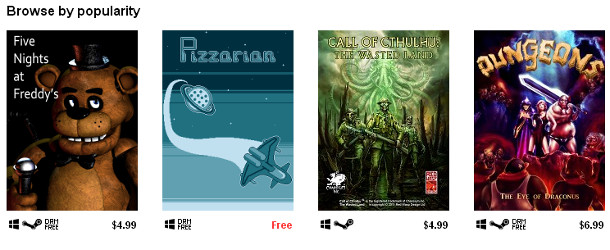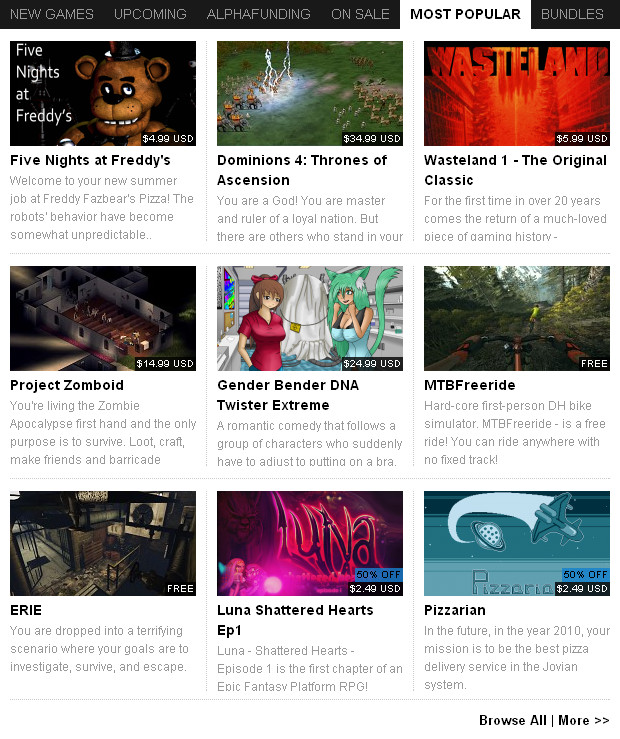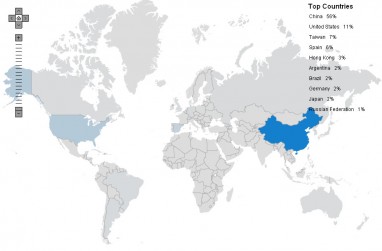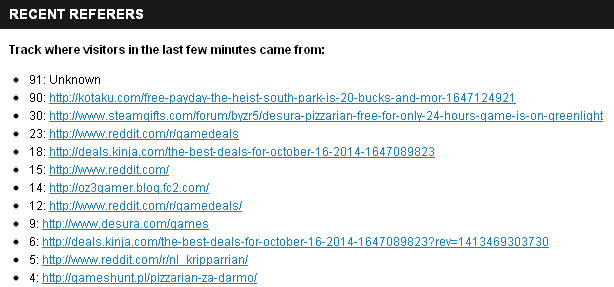 Making a successful game is a lot of work. Not only in creating the game, but also in promoting it. You have to be sending out emails, you have to be active on social media, you have to be submitting your game to as many store fronts as you can. Promotion in itself is a full-time job, and having a successful campaign takes a lot of work.
Making a successful game is a lot of work. Not only in creating the game, but also in promoting it. You have to be sending out emails, you have to be active on social media, you have to be submitting your game to as many store fronts as you can. Promotion in itself is a full-time job, and having a successful campaign takes a lot of work.
But, even more so, it takes a lot of luck.
Pizzarian wasn’t particularly successful when it was originally released. It was my second game, after Star Runner, and despite spamming my Twitter and Tumblr feeds with links to the game, links to previews and trailers, links to the one or two reviews I managed to get…I could barely even convince people to claim the free download codes I was sending out every day. I sent out over 100 emails to review sites large and small, indie gaming podcasts and YouTube channels, and anywhere else I thought might have some iota of interest in a four-color pizza delivery business sim space shmup like mine.
Over 100 emails, and only four claimed the free review codes I included. Only one of those sites actually commented on my game. Being nearly six months after release at this point, I had pretty much given up on trying to promote the game any further. I had been running it in Desura’s Cheap End sales alongside Star Runner, but I hadn’t done much with it beyond that.
That’s when my first stroke of luck hit.
For whatever reason, Desura decided to include Pizzarian in its Weekly Release Highlights video on October 6th, and they followed it up with posts on their Twitter and Facebook. Banking on this, I spent the entire day running around on social media—posting my own messages, sharing Desura’s posts, and handing out free download codes wherever I could. I set the game at 50% off, but I could barely even get people to take the free codes, much less buy the game. I didn’t want to lose the free press, so I went all-out and put the game on sale for free.
And…not much else really happened, honestly. I was getting maybe a few dozens hits every hours, but even for free, the game was barely getting any downloads. There’s only so much you can do yourself. It doesn’t matter how much you promote your game, especially as a solo developer—unless other people are talking about it, especially popular sites or famous people, nobody’s going to care.
The next morning, I load up Desura and…
What’s this?! I’m on the front page? Did something happen while I was asleep—was I posted on Reddit or picked up on by some reviewer? Where did everyone come from? Desura’s analytics only let you see where hits came from in “the past few minutes”, so that’s kind of useless. Let’s go check the demographics…
How about that. Apparently, China loves my game.
I later found out that one of the people who claimed a free code the night before posted about the game on a Chinese gaming forum—and, not only did they enjoy the game, but they were engaged enough to vote for it on Steam Greenlight. I’d never gotten this kind of support, before. Counting the number of downloads from China from Desura’s demographics, I had more than half that number in new votes on my Greenlight campaign, and many of them were commenting as well. Most of the comments just said “voted”, sure, but there were some that gave encouragement. Mostly “don’t cry”, but I’ll assume that it was meant in a good way.
Supremely encouraged, I got back at it on Twitter and did my best to keep my game on the front page. Not every user checks the front page—but, sites that post links to deals do. Desura seems to only rank “Most Popular” games by views and not downloads, so my job wasn’t entirely impossible. I started to get picked up by other sites: A Spanish-language gaming site, a Polish gaming forum, a Brazilian Steam community, a Japanese gaming blog. I was a little sad that my game couldn’t be in their native language, but I hoped they were enjoying it nonetheless.
Eventually, I was seeing my game on deal and sale aggregators, and I started making my way up the list! Slowly but surely…and, then suddenly! My game got posted on Reddit—twice! The hits were pouring in! The next morning, I woke up and my game was #2!
It was time. I quickly wrote up a press release and targeted it to the top 10 contacts on my list. Pizzarian positioned to take Five Nights at Freddy’s‘ top spot on Desura?! Granted, people were actually paying for Freddy’s, but nobody needed to know that. It made a pretty good subject line, I thought.
That’s when my second stroke of luck hit.
Did I get reviewed by every single site? Did I get reviewed by at least one site? Did I at least get somebody to comment on my game at all?
I got a single text-only link in the middle of a long list of deals posted on Kotaku.
But, it was enough. That tiny link on Kotaku outdid everything I got from Reddit. Thousands of people came flowing in. It was time to execute my master plan! Seeing that I was nearing my peak, I flipped the switch and set the game from 100% off to 50% off. With thousands of people seeing my game each day, surely I’d make some a few at least one sales!
Things eventually died down. I had my fifteen minutes of fame. I had cruised my way to a little over 2,000 downloads, and I gained almost 10% on my Steam Greenlight campaign…but, a week later, and there’s nothing left. No sales, no residual buzz beyond maybe a couple dozen hits a day still coming from the Kotaku and Reddit posts.
What can I say that I’ve learned? Maybe that I should take fellow GameCola staff member Dan Castro up on his gracious offer to help with translating my games, since I seem to get a lot of interest from people who don’t speak English. Maybe that it’s good to have friends who post on Reddit, since they’re pretty strict about self-promotion, but you can gather a lot of interest there. And, definitely that sending emails out to huge sites like Kotaku are always worth the long shot, seeing that even the tiniest mention can lead to thousands of hits. I can only imagine the kind of interest that would be generated by a full review.
The support of fellow developers and reviewers was also crucial to getting started. Even if it was only a couple hundred hits at most over the course of the whole ordeal, the retweets, likes, and shares of people in the indie gaming community were what pulled me onto the Desura front page at the start, putting me in a position to get noticed by other sites.
Even if I didn’t make any money from promoting my game for three days, I’m glad that I was at least able to get even a moderate amount of downloads. All of my previous campaigns have ended with ten or twenty downloads at best, and seeing what worked and where people came from gave me some interesting insights that I can use for promoting my next game. I just need to hurry up and wrap that one up!





Working on a review now! Mostly just needs screenshots and a little streamlining, plus I want to make sure I’ve gotten to 100% market share to ensure I haven’t missed anything.
Not to give any spoilers, but hopefully to save you some frustration…! Market share increases how many pizzas are ordered, and also how likely it is for you to get into a dogfight with Big Pizza. If you’ve bought every upgrade, ship, and piece of equipment, you’ve done basically everything in the game.
That’s what I figured! But I wanted to be thorough. I’m at 93.8% market share, so playing long enough to get all the screenshots I want might be all it takes to get me there anyhow.
Alex yells at me when I talk about reviewing his games. : (
That’s why I just started writing a post and didn’t tell anyone until I was too far along to cancel it. 😉
Pleaaaaaaase please please tell me you’re not reviewing:
1) Your friend’s game, for
2) Your friends website, where
3) Your friend has a supervisory relationship over you.
That crosses pretty much every line there is and I’m pretty sure it’d be grounds for getting fired out of a canon at Kotaku, even if you put a disclaimer or whatever at the top.
When you put it like that, Paul, it sounds like a bad idea.
The way I was looking at it, the developer essentially supplied me with a review copy by giving the game away the other week on Desura. I write for a website that does game reviews, and that has talked about this game a fair bit without formally reviewing it. We’re big on supporting indie developers, and we’re one of the only sites that might review this type of game in the first place. Deliberately withholding a review because of who the developer is puts that developer at a disadvantage.
Recognizing that the developer is someone I know personally, I’ve endeavored to adhere to the highest standards of journalistic integrity to keep my review as bias-free as possible. The opinions expressed in the review are the same ones I would express on any other review site, or in a private e-mail to Jeddy. Also recognizing that he’ll most likely be the one to edit the post before it goes up, he can still veto the review if he doesn’t like what I’ve said or how I’ve said it. If anything is worth firing me over, expressing it in a GameCola review that never sees the light of day is just as good as in a private e-mail or on my personal blog.
And if he doesn’t feel like firing me, or in fact *likes* what I’ve written, then it’s good publicity, more content for the site, support for an indie developer, and shows that we’re SO outside the mainstream that we develop our own games just so we have something to write about.
I’ll concede that this review could be a bad idea, and I’m willing to scrap it or publish it on GameFAQs instead if it’s in my best interests and for the good of the ‘Cola. But I’d be doing this game, this developer, and myself a disservice if I let the fear of publicly and transparently expressing a fair and honest opinion keep me silent.
I’ve got an idea: I’ll roll a d10 like I always do to determine the game’s review score. Jeddy, you flip a coin: heads, I stay; tails, I’m fired. Then we can compare notes and laugh or cry about it without even needing to look at the review.
…Good news! Pizzarian is a perfect 10. Honest to goodness, that’s what I rolled.
I know you well enough to know that you’re not going to give Jeddy a high score because you’re both bros, but I don’t think there’s any way I could be convinced that this is okay. To put it another way, you’re reviewing your boss’s game, for your boss’s website. Or, GameCola is publishing a review of a game that GameCola developed. Or, Jeddy is editing and publishing a review of his own game.
I don’t think there’s any way you can disassociate these things and just say you’re trying to support an indie developer. I think it even makes it worse that Jeddy’s the one who ultimately has veto power over this–he’s the one who made the game!
I don’t believe there are any shady ill-intentions here; I 100% believe that you’re doing this because it’s good content that fits the theme of the site, and that you want to support an indie developer. But the fact that you’re friends with that developer, and–much more importantly–this website also belongs TO that indie developer makes everything weird. No matter how good you guys are, there’s way way too many conflicting interests here.
I appreciate the vote of confidence, and I completely understand what you’re saying. You make a compelling case, to the point where I really am thinking about submitting this to GameFAQs instead. Except I don’t think I can include pictures in my review, and I was really hoping for pictures.
I guess my perspective is different because I work in an industry where conflicts of interest are a fact of life. It’s either full disclosure, or nobody ever works with anybody and nothing gets done.
I think about our RPGcasts: Except for the Maid RPG, they’re all games created by GC staff, and they were essentially reviewed by GC staff over the course of playing them. Even linking to our own websites at the bottom of the main site, and referencing our own side projects in our posts and videos and podcasts, could be construed as conflicts of interest. What if we’re only writing to promote ourselves, however small that self-promotion might be?
The main issue is where to draw the line. What happens if I’m on a podcast and we get onto the topic of Pizzarian, and I say all the things I would’ve said in a review—would we need to excise that section of the podcast? How many times can we let Michael Gray write about walkthroughs he wrote for a different website, and videos he recorded for his personal YouTube channel, before it becomes a conflict of interest? Is every game with a staff member’s name *anywhere* in the credits off limits for a review?
These aren’t unanswerable questions, but we don’t have any formal guidelines in place (as far as I’m aware) that say how to address them. I think a general discussion of GC policy in this area might be in order, and that way we’d be setting a standard with whether or not I submit my review here, rather than making a one-off judgment call that could have unexpected implications down the line.
After further consideration and discussion with Jeddy, you’ll be pleased to know that we’re erring on the side of caution and having me post my review elsewhere, probably GameFAQs. This also yielded an important addendum to the new Style Guide wiki that now covers this type of situation in writing.
Excellent! Thanks for the update!
I swear I’ll give you that one-th sale some day. Pizzarian’s been on me wishlist since I’ve heard you speak about it on the GC podcast some time back. Just shows that just mentioning the game may even be enough for some fame, even if minor.